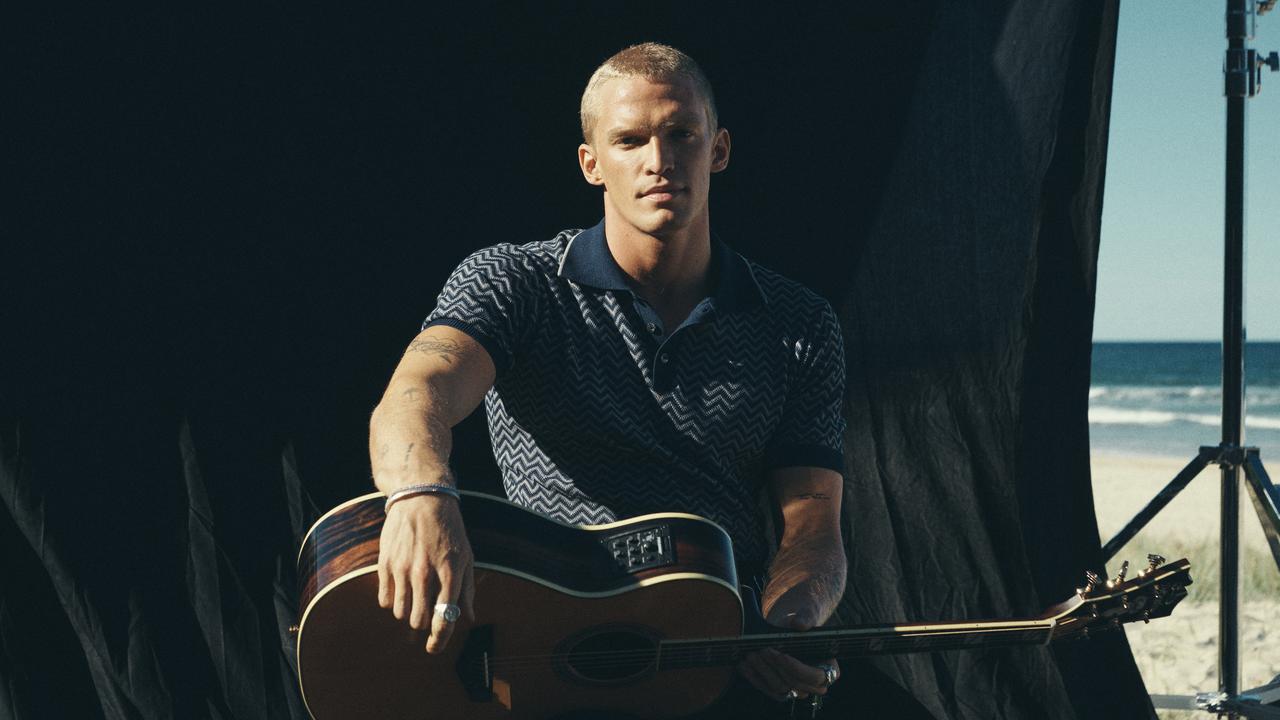Richard Dormer plays Belfast punk Terri Hooley in Good Vibrations
NORTHERN Irish actor Richard Dormer’s first cinematic lead role has opened the door to a new stage in his career.

IN 1978, star BBC DJ John Peel dropped his stylus on Teenage Kicks, a song by an unknown group from Northern Ireland called the Undertones. With its fanging guitars, wobbly falsetto vocals and catchy “I wanna hold her wanna hold her tight” chorus, Teenage Kicks had the makings of a punk-pop classic; when the song finished Peel did something he’d never done on live radio. He played it again.
At the same time, in his Belfast bathroom, Terri Hooley was feeling despondent. It had been four days since he’d got down on his knees at BBC Broadcasting House in London and begged them to give the single, in its wraparound white paper sleeve, to Peel. With the Troubles, the bloody sectarian violence, raging outside, Hooley’s quest to put Northern Ireland back on the music map was looking hopeless.
The scene where Hooley hears his wife’s faint cries of joy, then rushes down and bounces around the living room to Teenage Kicks x 2 is one of several highlights of Good Vibrations, a cheerful biopic that tells the story of this so-called “Belfast Godfather of Punk”. In 1977 Hooley opened a record shop in the heart of a divided city, providing a space for young people of all faiths to hang out. He went on to promote gigs and establish a label, also called Good Vibrations, which released punk anthems by rebellious, non-sectarian Ulster youth.
“Terri was blind to colour, creed and division,” says Irish actor Richard Dormer, 44, whose performance as the bearded, one-eyed Hooley carries the film. “He was passionate about the uniting force of music. He kept young people off the streets and gave them something to live for, even if it was just getting together once a week in a grotty, spit-covered bar.”
There have been other dramatisations of Belfast and its history. But Good Vibrations feels more authentic for its clever use of 1970s archive footage — a cut-and-paste effect reminiscent of a punk fanzine — and the fact it was made by a local cast and crew, including husband-and-wife directing team Glenn Leyburn and Lisa Barros D’Sa. Dormer was nominated for best actor at the 2013 Irish Television and Film Awards for his portrayal of Hooley, his first lead cinematic role.
“Good Vibes reaches all over the world regardless of politics and language,” says Dormer over coffee in a members club in Soho, central London. “I’ve been to 10 international festivals with it — Berlin, Moscow, Austin in Texas — and every single time it’s got people up clapping and cheering at the end.”
A diverse soundtrack by Gary Lightbody of the band Snow Patrol and musician and composer David Holmes, the man who made the films Ocean’s Eleven, Twelve and Thirteen so hip, includes bits of reggae, country and 60s pop. But the genre that has the most impact — spitting and snarling as Belfast implodes and Hooley comes under threat from police, paramilitaries and his penchant for booze — is punk.
Hooley’s peace-loving DIY aesthetic dovetails with emergence of the likes of Rudi, the Outcasts and the Undertones, who he wavered over (“Nobody rated them,” he has said) before selling the rights to Teenage Kicks for £500 and a signed photo of the Shangri-Las. Now aged 66, and having reopened his Good Vibrations shop for the umpteenth time, Hooley remains an idealist and a maverick. He was never a businessman.
“If Terri hadn’t lost an eye as a kid (to a toy arrow) he wouldn’t be who he is,” says Dormer, who grew up in Lisburn, Greater Belfast, hearing mention of Hooley’s name. “He literally saw the world differently and it heightened his senses, made him appreciated music that much more.”
Dormer never frequented the original Good Vibrations shop in Great Victoria Street, then nicknamed “Bomb Alley”. The youngest of three children born to a shop assistant mother and a psychiatric nurse father who moonlighted playing piano in hotels, he was more into books and poetry than music. He planned on being a writer before acting in a play by Seamus O’Casey at high school and being encouraged to pursue drama as a career.
“Everyone told me, ‘You’re great.’ I was like, ‘Am I?’ It was too easy.”
Stints at the Ulster Youth Theatre and a scholarship to London’s Royal Academy of Dramatic Art followed. Life in the British capital was tough for a 17-year-old with a strong Northern Irish brogue and a chip on his shoulder.
“Northern Ireland is cool now but my generation grew up feeling like second-class citizens, neither English or Irish.” A pause. “I’d go into pubs carrying a bag and they’d hear my accent and tell me to get the f..k out, thinking I was an IRA terrorist.”
After living and working non-stop as an actor in London, Dormer moved to Dublin and took a three-year break from acting: writing poetry, travelling around, thinking meaningful thoughts.
“I had it all at the beginning and I didn’t want it,” he says. “I got back into it through a friend.
“It took me a while to appreciate that acting is a tough life and that the older you get the tougher it is. But I’d rather have success now than when I was younger.”
Dormer combined playwriting with acting and won praise for his performance as Northern Irish snooker star Alex Higgins in Hurricane, which he wrote himself in 2003. After an award-winning turn in Frank McGuinness’s Observe the Sons of Ulster Marching Towards the Somme and roles in plays, including George Bernard Shaw’s You Can Never Tell — under director Peter Hall at the Theatre Royal in Bath, England — Dormer was commissioned to write a play by Dublin’s renowned Abbey Theatre.
The result, in 2012, was the acclaimed Drum Belly, a tale of Irish-American gangsters in New York that was set on the weekend of the historic first moon landing in 1969 and featured a soundtrack of songs (“The Stooges, Creedence Clearwater Revival, gutsy energetic rock ’n’ roll”) cherry-picked by Holmes.
“David is a good friend of mine,” says Dormer. “He showed me that a good piece of music is often more effective than words. I was never a big music fan until Good Vibrations came into my life. I thought punk was just noise. I loved the guitars in Teenage Kicks but I couldn’t stand Feargal Sharkey’s voice. But now I look back and realise how much it captured that youthful angst.”
His recollections of the Troubles are still vivid: “Thankfully I didn’t lose anyone I knew but they shaped all of us. I remember watching television with the family on a Saturday night and there’d be this deep boom and our big window would buckle in and out and we’d casually go, ‘Oh, that sounds like Dunmurry’ or ‘I think that was Finaghy’ and continue watching TV.”
Lisburn was a Protestant-loyalist stronghold; Dormer’s first girlfriend was Catholic.
“I thought just like Terri Hooley would,” Dormer says. “Which was, screw it! The only way this war is going to finish is if we ignore the people who tell us what we can’t do and do what we think is right.”
Dormer has become a popular television actor in roles that both embrace and transcend his nationality. His most famous TV character to date, the role that gets him stopped on the street, is that of Lord Beric Dondarrion, the one-eyed, flaming sword-wielding outlaw from season three of HBO phenomenon Game of Thrones — which happens to be filmed in Northern Ireland.
“I must do great one-eyed bearded scar work,” he quips. “I had to audition six times for other parts before I got Beric. It was an in-and-out job, no real commitment. I’ve never watched the show.” He laughs as my jaw drops. “I’m in the Walking Dead camp.”
Along with Good Vibrations, Dormer has three other films set for release this year: the Northern Ireland-set 71, in which he plays an ex-British Army medic who takes in a wounded soldier being sought by the IRA. He’s a cop in Hyena, a gritty thriller about the Albanian and Turkish mafia in London, and a father with a thing for Greek philosophy in Shooting for Socrates, an upbeat flick telling the story of Northern Ireland’s 1986 World Cup game against Brazil (“We lost”). But the role predicted to make Dormer a household name is that of Sheriff Dan Anderson in Fortitude, an ambitious 12-part Sky TV drama series he’s filming in Iceland and London; his supporting cast includes Christopher Ecclestone (Doctor Who), Michael Gambon (Harry Potter) and Sofie Grabol (The Killing). “It’s set on an island in the Arctic Circle where a British scientist is brutally murdered and I try to make sense of it. The writing is amazing.”
Good Vibrations has done what it says on the tin: “Good Vibes is my calling card. I proved I could hold a film together emotionally and tell a narrative as a lead character, and the offers have rolled in,” he says.
“When I hit 40 I wondered, will I ever be the lead in a film? Luckily, better late than never, I got the chance.”
And better late than never, he got into music. And record shops — that most beleaguered of retail outlets. Interview over, we chat about Record Store Day, an annual (April) event that champions independent record stores around the world. We decide to pay a visit to Reckless Records, whose orange shopfront features on the cover of Oasis’s (What’s The Story) Morning Glory?, a block away.
A handful of people are hunched over, flicking through old vinyl. As we approach the assistant behind the desk, Dormer puffs up his chest and does his best, brashest Terri Hooley impression.
“Have yer got Teenage Kicks?” he says loudly. And there it is, up high on a wall. The original seven-inch in its wraparound white paper sleeve, announcing itself in big black upper-case letters. A collector’s item, priced accordingly.
“Grand,” Dormer flashes a grin. “It’s a f..king great record.”
Good Vibrations is released on June 12.


